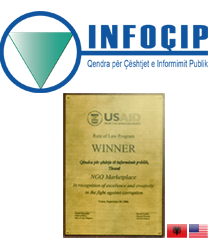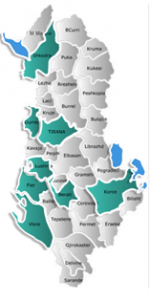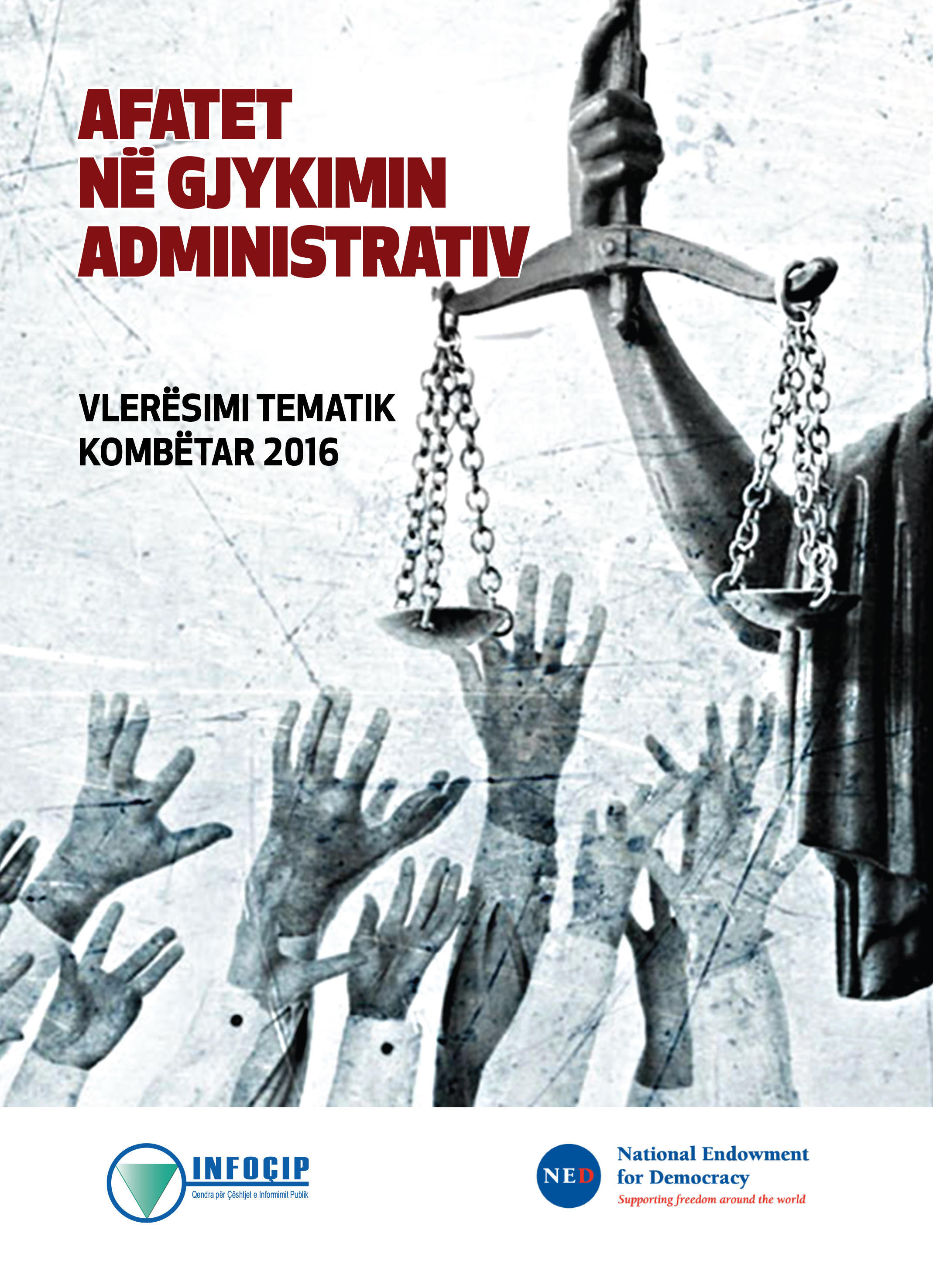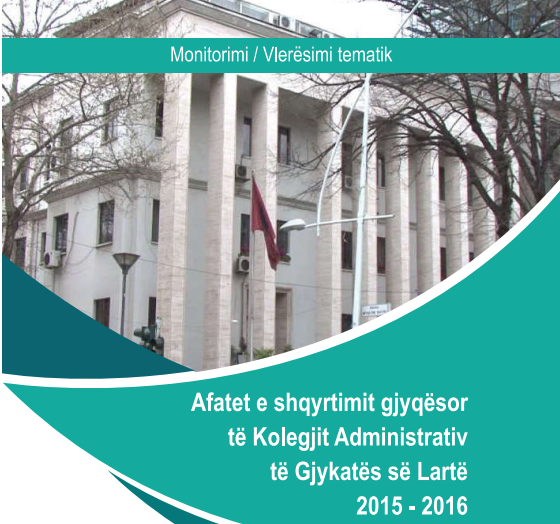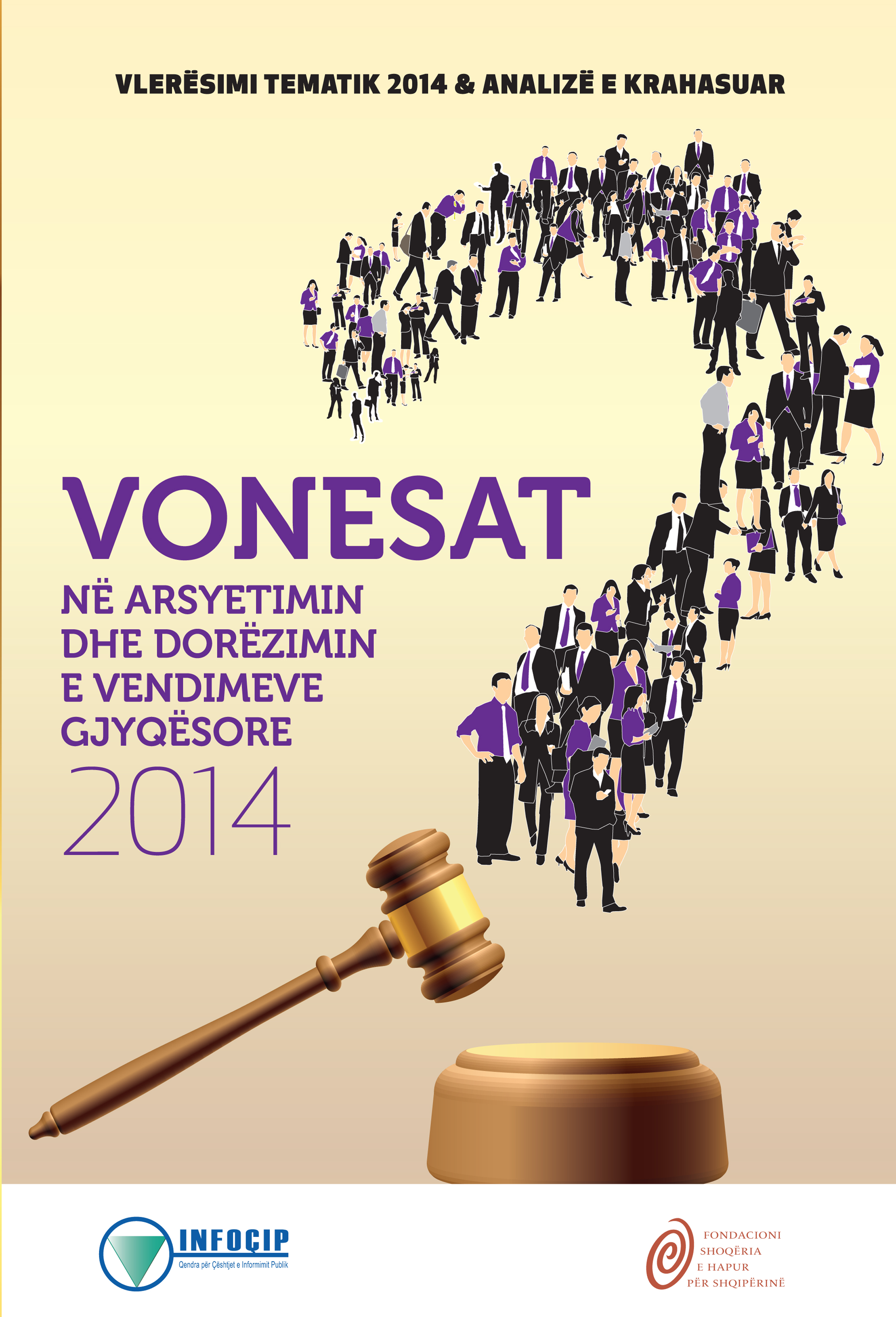New Monitoring Report launched by CPII: “Transparency of Decision Making & Public Participation in Durres Municipal Council”
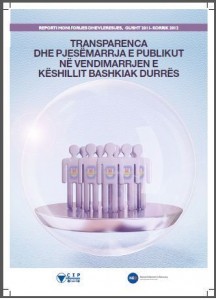 “Transparency of Local Decision-Making and Public Participation in Durres Municipal Council” is the final product of a new initiative taken by the Center for Public Information Issues. Subject to monitoring and assessment in the framework of this research is the activity and functioning of Durres Municipal Council in two aspects, which are clearly defined by the law: guaranteeing public participation in the decision-making process and the practical implementation of the decision-making process, which consists of discussion, voting and announcement of the decisions. This Monitoring was conducted with the important support provided by the National Endowment for Democracy (NED), with its headquarters in Washington D.C.The period covered by this monitoring starts in August 2011 and ends on July, 2012 (12 months). The reason why this period does not cover a full calendar year, but is divided in two consecutive years, is related to the delay in establishing the new Municipal Council in Durres, following the completion of local elections of May 8, 2011. The new elected Council was established only in August, 2011. The first 12-months session of the new Municipal Council concluded exactly on July, 6, 2012. The novelty of this monitoring is that for the first time it combines a double assessment of the public’s right to participate in the local decision-making and the obligation of the Municipal Council to conduct the decision-making process pursuant to the relevant provisions of the law 8652 “On the Organization and Functioning of the Local Government”, amended. In order to conduct this double assessment, the Center for Public Information Issues (CPII) developed a specific methodological tool, called PROACTIVE, which represents one of the most important approaches in the frame of this initiative. PROACTIVE (modified acronym for: Protocol for Assessing Transparency in Decision-Making of the City Council through Active Civic Participation“ is sui-generis, which means that is “tailor-made” for the relevant legislation in force in the Republic of Albania, concretely the Law 8652 “On the Organization and Functioning of the Local Government”, amended. PROACTIVE is specifically designed also to assess and evaluate the level of proactive disclosure not only of the enacted decisions, but of the entire decision making process, as activated and provided by the public decision making body in local level (municipal council).It is clear that, in the focus of this monitoring is exclusively the activity of the Municipal Council, which exercises the functions of the collegial decision making body at local level. The administration of the Municipality as a centralized monocratic body, headed by the Mayor, is not subject to monitoring. This differentiated approach represents also another novelty, if we bear in mind that no attention has been paid so far to the division and separation of the decision-making and executive powers at local level, in the context of evaluating and assessing the transparency by the civil society operators or even international organizations working in Albania.The CPII has calculated also the level of implementation of the relevant legal provisions by Durres Municipal Council itself. Concretely, subject to evaluation and assessment in the frame of this report is the implementation of the Articles 33, 34 and 35 of the organic law 8652 “On the Organization and Functioning of the Local Government”, amended. These articles set the modalities of the discussion (including the one with the public), voting process, announcement and entry into force of the decisions of the Municipal Council. Functioning of the Council in compliace with these legal provisions is a judicial and factual condition to guarantee a lawfull and transparent decision-making process, throgh ensuring public participation and effective access to the local legislation ( Announcement Notification of the decisions enacted by the Municipal Council). It is clear that in the context of this monitoring research, access of the public to the Council’s decision is not the same with the participation of the public in the decision-making process. This clear distinction between these two composite concepts, even though they are in fact organically linked, provides clear methodological advantages to assess transparency during all steps of the local decision-making process. This careful and clear concept distinction and separation for assessment purposes could be considered another important novelty of this initiative.The evaluation results concerning the level of implementation of the legal provisions are presented in graphs and percentages. This evaluation is also conducted for the first time in Albania. The method developed and employed by the CPII could serve as a model for other actors, too, who have an interested in the objective assessment of the implementation of specific laws or provisions at local government level. Durres Municipal Council is specificely targeted by this montoring findings, without excluding though the municipality administration. Donors (governmental or non-governmental), who cooperate with the local government and community, are another specific target, too. Another intended target is the local media in Durres. This report will become available also to all Durres citizens, so that they star to evaluate from a different prospective the performance of their elected representatives in the Municipal Council. The Report “Transparency of Local Decision-Making in Munilcipal Council of Durres and Public Participation” is published when less than a year remains from the deadline of the implementation of the Crosscutting Strategy in the Public Administration (CSPA), ‘09-’13. Part of the government vision stated in this important document is “an administration based on transparent decision-making processes, which is involved and accountable to the public”. The findings of this report provide an additional opportunity for the Central Government to evaluate how the objectives set out in the framework of the CSPA have been met, especially with regard to “transparent decision-making processes”. This report is published at a time when the Albanian Government has joined also global initiatives that aim at increasing the transparency in the decision-making process, such as the Open Government Partnership, joined by Albania on August 2, 2011.The Center for Public Information Issues, as a civil society operator specialized in the area of access to legislation and transparency of official publications, adheres to the motto that “Albanian citizens should know what decisions are taken on their behalf”. The official acts, at central and local level, are a public asset of unique value and as such they should be effectively available and accessible to all citizens. In this sense, the assesssment of the level of this access is a direct indicator to evaluate the compliance with the commitments already taken by the Albanian state not only towards itself, but also at international level.In the framework of the reforms that aim at decentralization, the access to local legislation has a special importance nowadays. The local government bodies, concretely Municipal / Communal Councils, carry out today a wide range of decision- making activities. With their extensive powers recognized by law, the local government bodies could take important decisions on territory and property, local taxes and tariffs, loans, grants, etc. Such important decisions, with a direct impact on population and territory, should necessarily be under constant and close public observation. This supervision must be conducted not only prior to the decision-making process (through consultative processes with the interested actors and public), but also after the decisions are been taken (through the Prefect and/or interested actors). The promotion of an efficient method, but also of a new culture of legal and democratic control on the official acts issued by the Municipal Councils, is one of the objectives of this initiative undertaken by CPII. The latter has extended its expertise and know’how obtained by monitoring state publications of the central constitutional institutions also to the local government bodies, hoping that in this way it is also bridging the gap (vacoom) created in the last 12 years, since the Law 8652, dated 31.7.2000 “On the Organization and Functioning of Local Government”, amended, entered into force.
“Transparency of Local Decision-Making and Public Participation in Durres Municipal Council” is the final product of a new initiative taken by the Center for Public Information Issues. Subject to monitoring and assessment in the framework of this research is the activity and functioning of Durres Municipal Council in two aspects, which are clearly defined by the law: guaranteeing public participation in the decision-making process and the practical implementation of the decision-making process, which consists of discussion, voting and announcement of the decisions. This Monitoring was conducted with the important support provided by the National Endowment for Democracy (NED), with its headquarters in Washington D.C.The period covered by this monitoring starts in August 2011 and ends on July, 2012 (12 months). The reason why this period does not cover a full calendar year, but is divided in two consecutive years, is related to the delay in establishing the new Municipal Council in Durres, following the completion of local elections of May 8, 2011. The new elected Council was established only in August, 2011. The first 12-months session of the new Municipal Council concluded exactly on July, 6, 2012. The novelty of this monitoring is that for the first time it combines a double assessment of the public’s right to participate in the local decision-making and the obligation of the Municipal Council to conduct the decision-making process pursuant to the relevant provisions of the law 8652 “On the Organization and Functioning of the Local Government”, amended. In order to conduct this double assessment, the Center for Public Information Issues (CPII) developed a specific methodological tool, called PROACTIVE, which represents one of the most important approaches in the frame of this initiative. PROACTIVE (modified acronym for: Protocol for Assessing Transparency in Decision-Making of the City Council through Active Civic Participation“ is sui-generis, which means that is “tailor-made” for the relevant legislation in force in the Republic of Albania, concretely the Law 8652 “On the Organization and Functioning of the Local Government”, amended. PROACTIVE is specifically designed also to assess and evaluate the level of proactive disclosure not only of the enacted decisions, but of the entire decision making process, as activated and provided by the public decision making body in local level (municipal council).It is clear that, in the focus of this monitoring is exclusively the activity of the Municipal Council, which exercises the functions of the collegial decision making body at local level. The administration of the Municipality as a centralized monocratic body, headed by the Mayor, is not subject to monitoring. This differentiated approach represents also another novelty, if we bear in mind that no attention has been paid so far to the division and separation of the decision-making and executive powers at local level, in the context of evaluating and assessing the transparency by the civil society operators or even international organizations working in Albania.The CPII has calculated also the level of implementation of the relevant legal provisions by Durres Municipal Council itself. Concretely, subject to evaluation and assessment in the frame of this report is the implementation of the Articles 33, 34 and 35 of the organic law 8652 “On the Organization and Functioning of the Local Government”, amended. These articles set the modalities of the discussion (including the one with the public), voting process, announcement and entry into force of the decisions of the Municipal Council. Functioning of the Council in compliace with these legal provisions is a judicial and factual condition to guarantee a lawfull and transparent decision-making process, throgh ensuring public participation and effective access to the local legislation ( Announcement Notification of the decisions enacted by the Municipal Council). It is clear that in the context of this monitoring research, access of the public to the Council’s decision is not the same with the participation of the public in the decision-making process. This clear distinction between these two composite concepts, even though they are in fact organically linked, provides clear methodological advantages to assess transparency during all steps of the local decision-making process. This careful and clear concept distinction and separation for assessment purposes could be considered another important novelty of this initiative.The evaluation results concerning the level of implementation of the legal provisions are presented in graphs and percentages. This evaluation is also conducted for the first time in Albania. The method developed and employed by the CPII could serve as a model for other actors, too, who have an interested in the objective assessment of the implementation of specific laws or provisions at local government level. Durres Municipal Council is specificely targeted by this montoring findings, without excluding though the municipality administration. Donors (governmental or non-governmental), who cooperate with the local government and community, are another specific target, too. Another intended target is the local media in Durres. This report will become available also to all Durres citizens, so that they star to evaluate from a different prospective the performance of their elected representatives in the Municipal Council. The Report “Transparency of Local Decision-Making in Munilcipal Council of Durres and Public Participation” is published when less than a year remains from the deadline of the implementation of the Crosscutting Strategy in the Public Administration (CSPA), ‘09-’13. Part of the government vision stated in this important document is “an administration based on transparent decision-making processes, which is involved and accountable to the public”. The findings of this report provide an additional opportunity for the Central Government to evaluate how the objectives set out in the framework of the CSPA have been met, especially with regard to “transparent decision-making processes”. This report is published at a time when the Albanian Government has joined also global initiatives that aim at increasing the transparency in the decision-making process, such as the Open Government Partnership, joined by Albania on August 2, 2011.The Center for Public Information Issues, as a civil society operator specialized in the area of access to legislation and transparency of official publications, adheres to the motto that “Albanian citizens should know what decisions are taken on their behalf”. The official acts, at central and local level, are a public asset of unique value and as such they should be effectively available and accessible to all citizens. In this sense, the assesssment of the level of this access is a direct indicator to evaluate the compliance with the commitments already taken by the Albanian state not only towards itself, but also at international level.In the framework of the reforms that aim at decentralization, the access to local legislation has a special importance nowadays. The local government bodies, concretely Municipal / Communal Councils, carry out today a wide range of decision- making activities. With their extensive powers recognized by law, the local government bodies could take important decisions on territory and property, local taxes and tariffs, loans, grants, etc. Such important decisions, with a direct impact on population and territory, should necessarily be under constant and close public observation. This supervision must be conducted not only prior to the decision-making process (through consultative processes with the interested actors and public), but also after the decisions are been taken (through the Prefect and/or interested actors). The promotion of an efficient method, but also of a new culture of legal and democratic control on the official acts issued by the Municipal Councils, is one of the objectives of this initiative undertaken by CPII. The latter has extended its expertise and know’how obtained by monitoring state publications of the central constitutional institutions also to the local government bodies, hoping that in this way it is also bridging the gap (vacoom) created in the last 12 years, since the Law 8652, dated 31.7.2000 “On the Organization and Functioning of Local Government”, amended, entered into force.
LAST RELEASED PUBLICATION
MONITORING REPORT
Recent reports/studies
Partners / Donors
Local Branches
- Citizens' Transparency Office, Durrës (19)
- Citizens' Transparency Office, Korça (9)
- Election Situation Chamber (11)
- JUDICIARY (1)
- NED (11)
- www.vendime.al (5)
Foto lajm

- CPII anounces the monitoring result for Durres Municipal Council. It must be re-elected
Where we work

